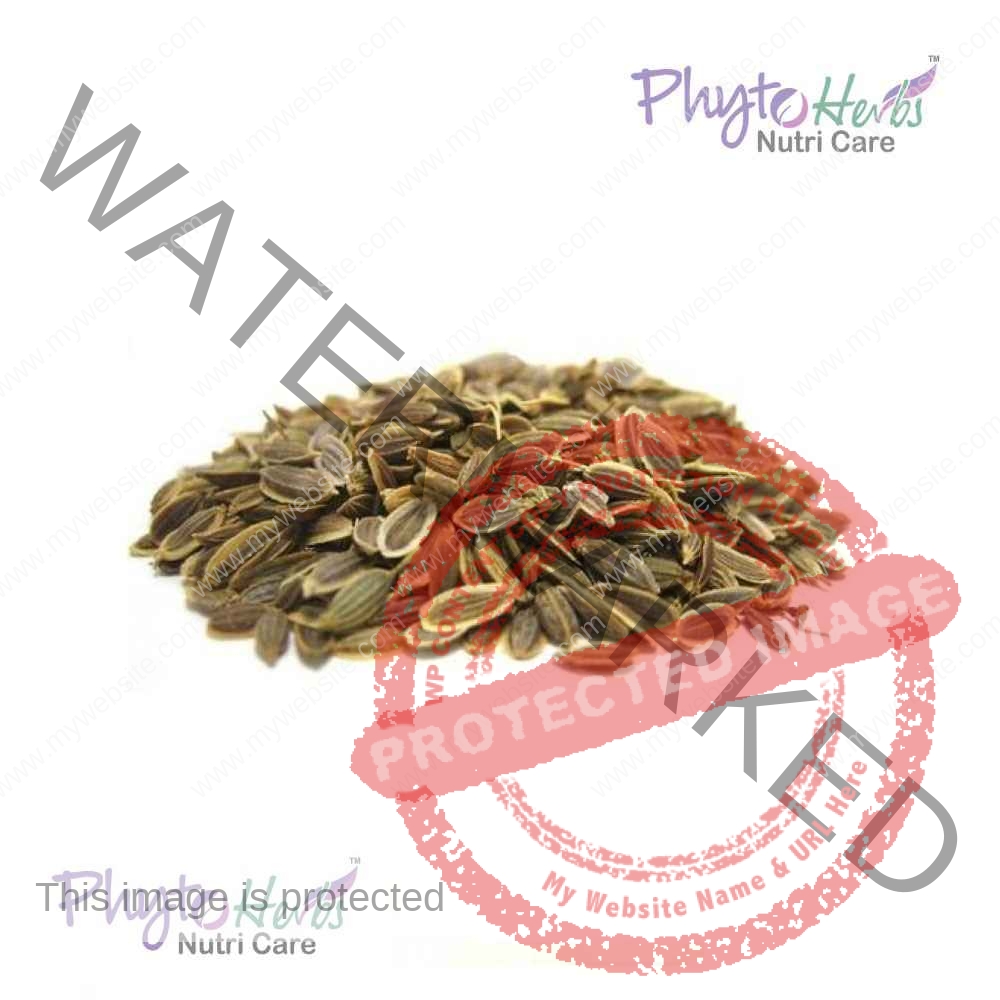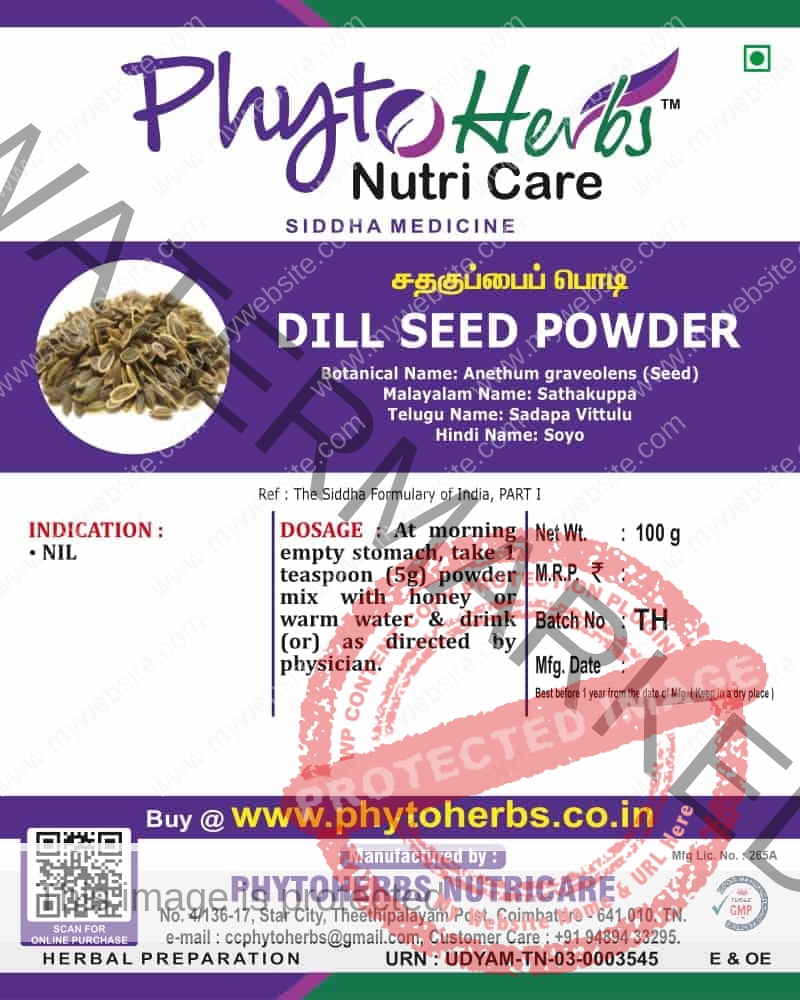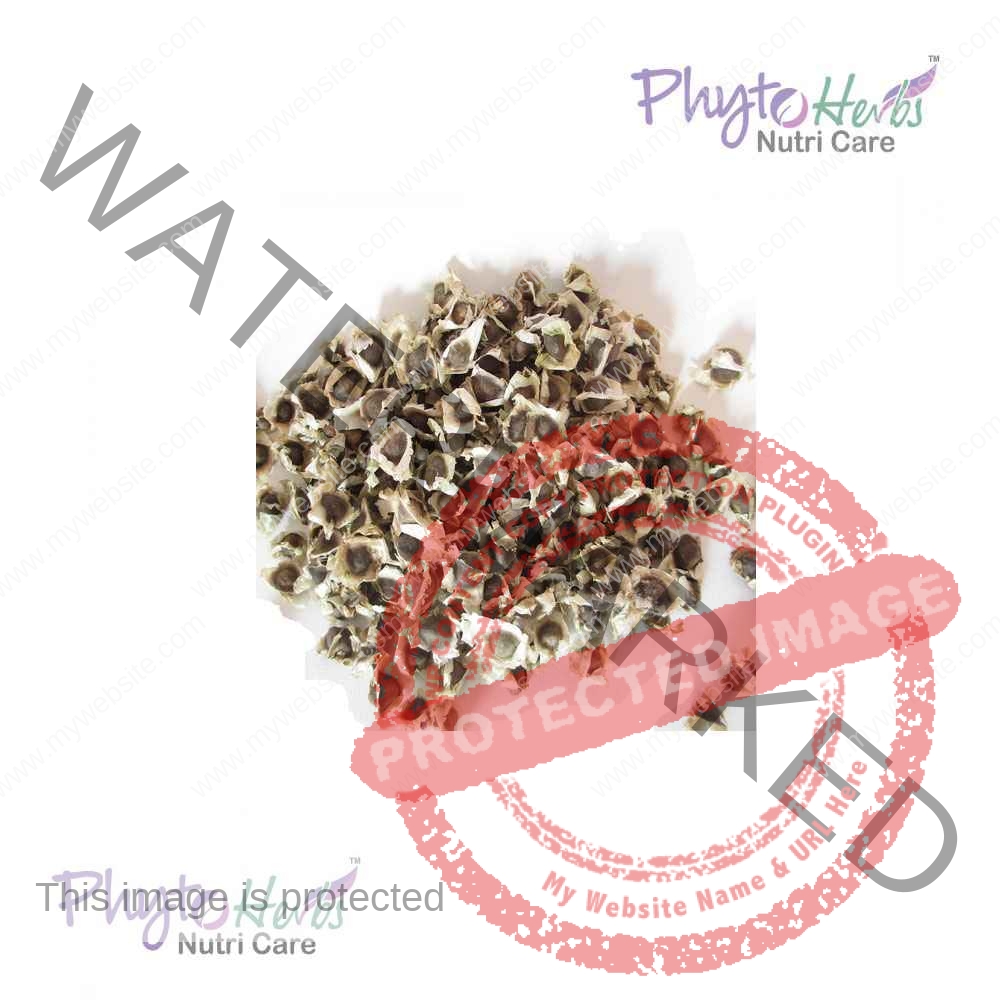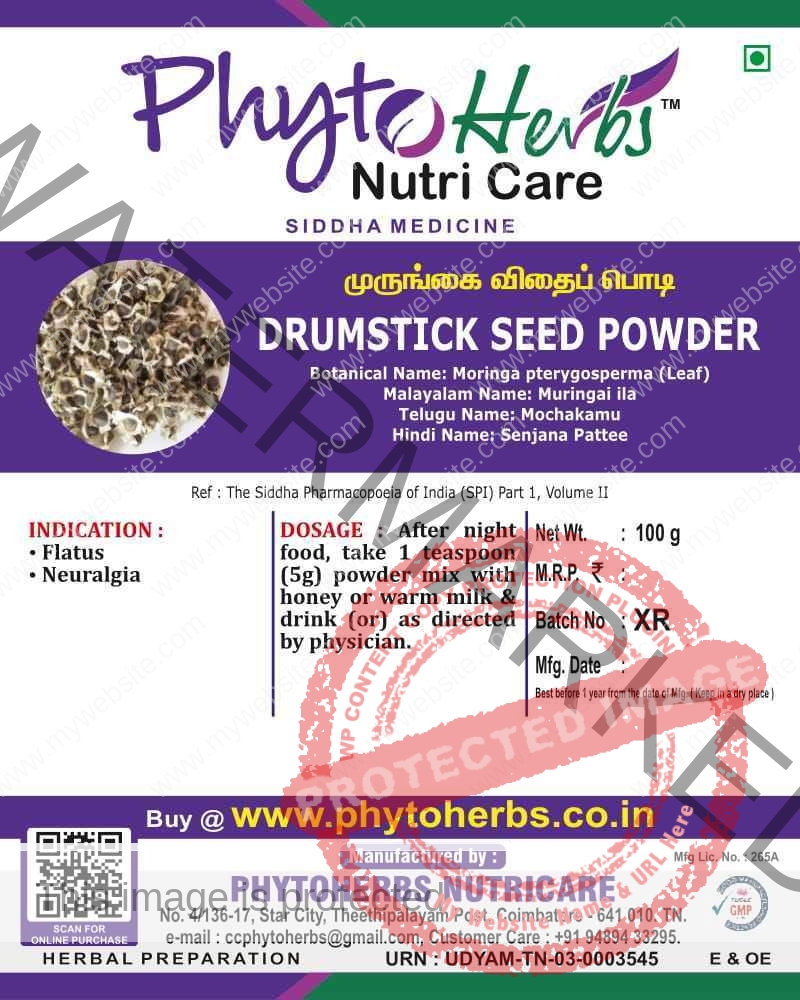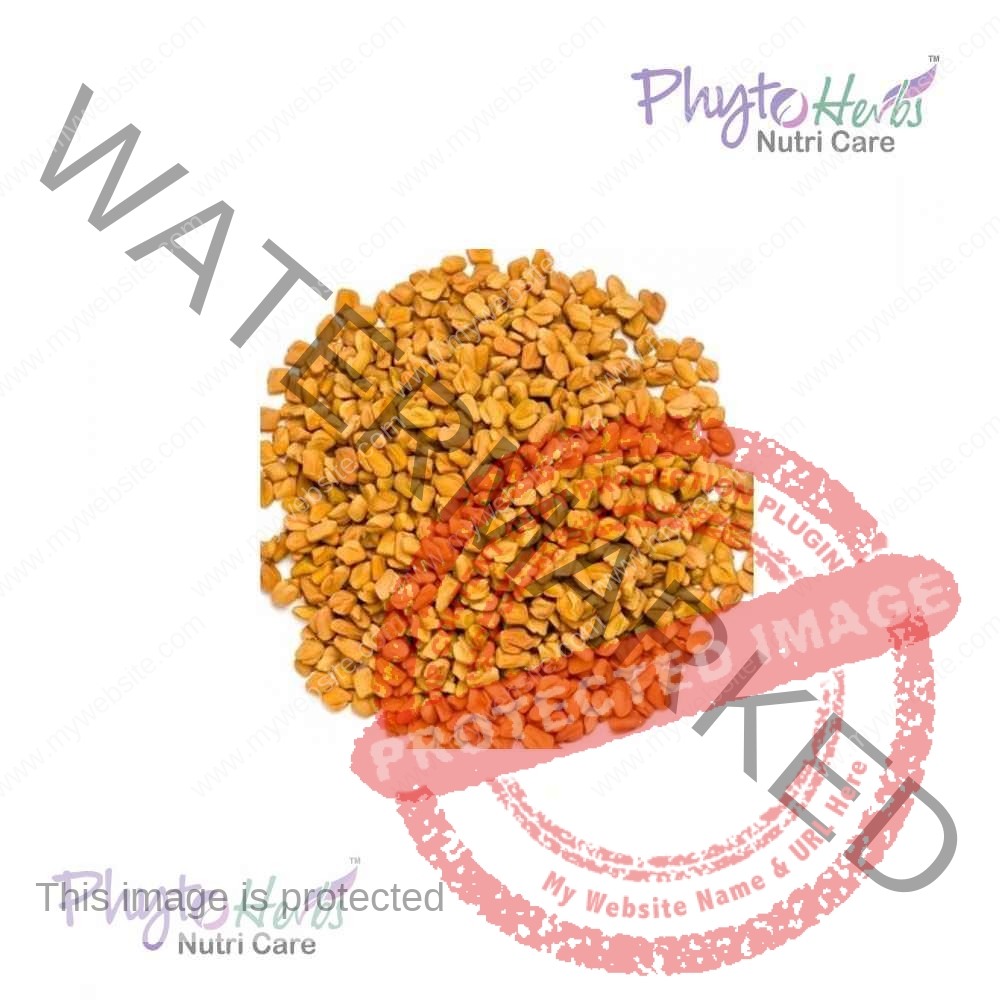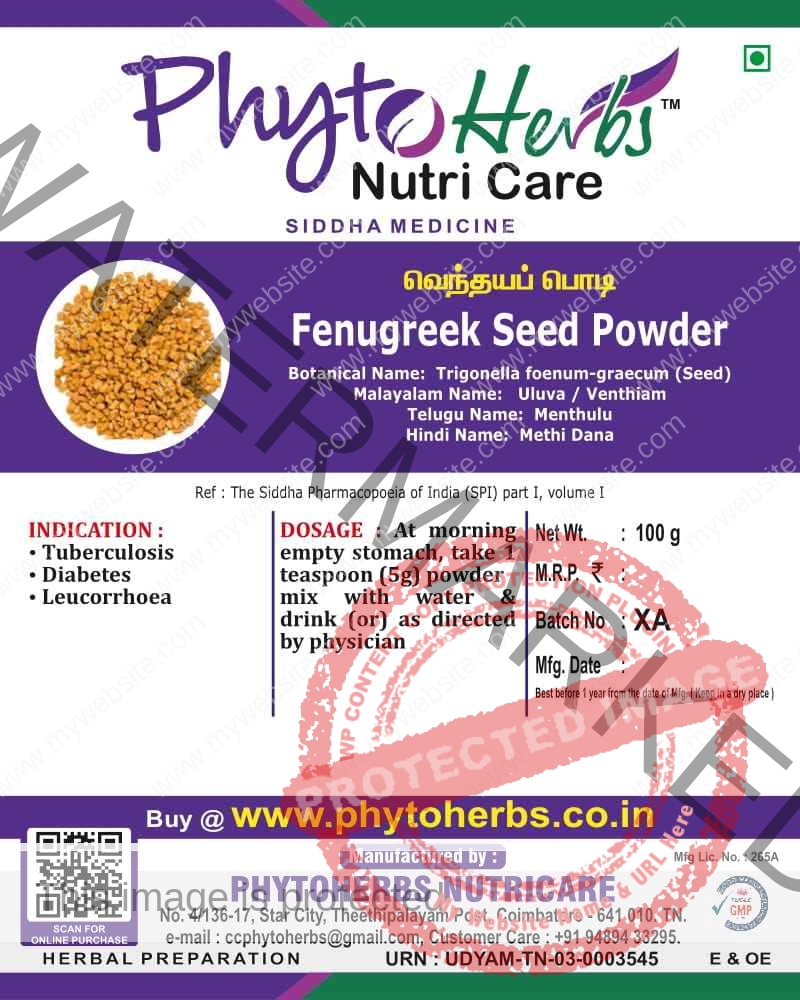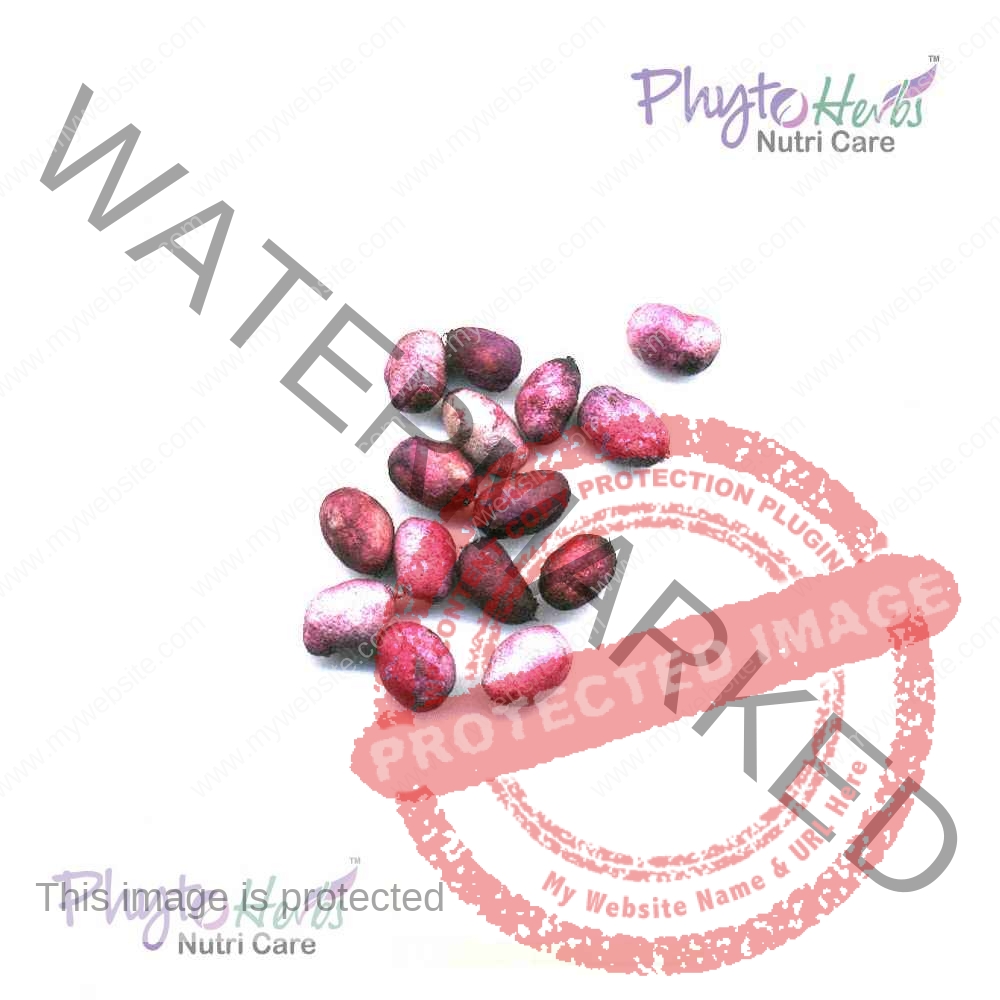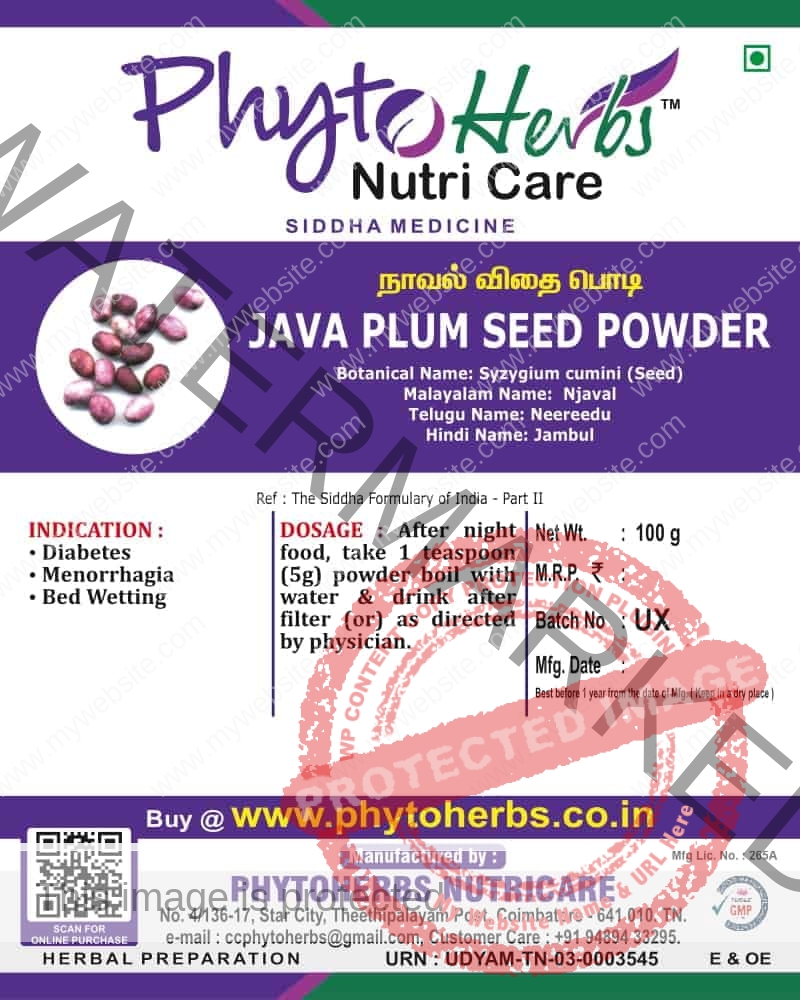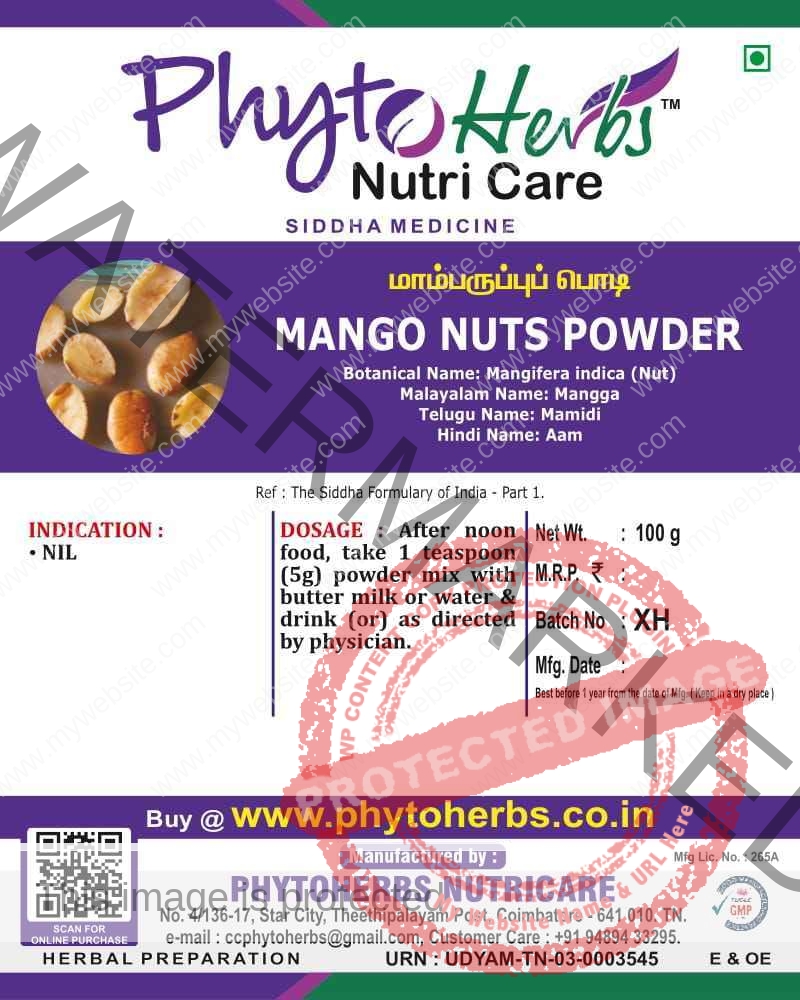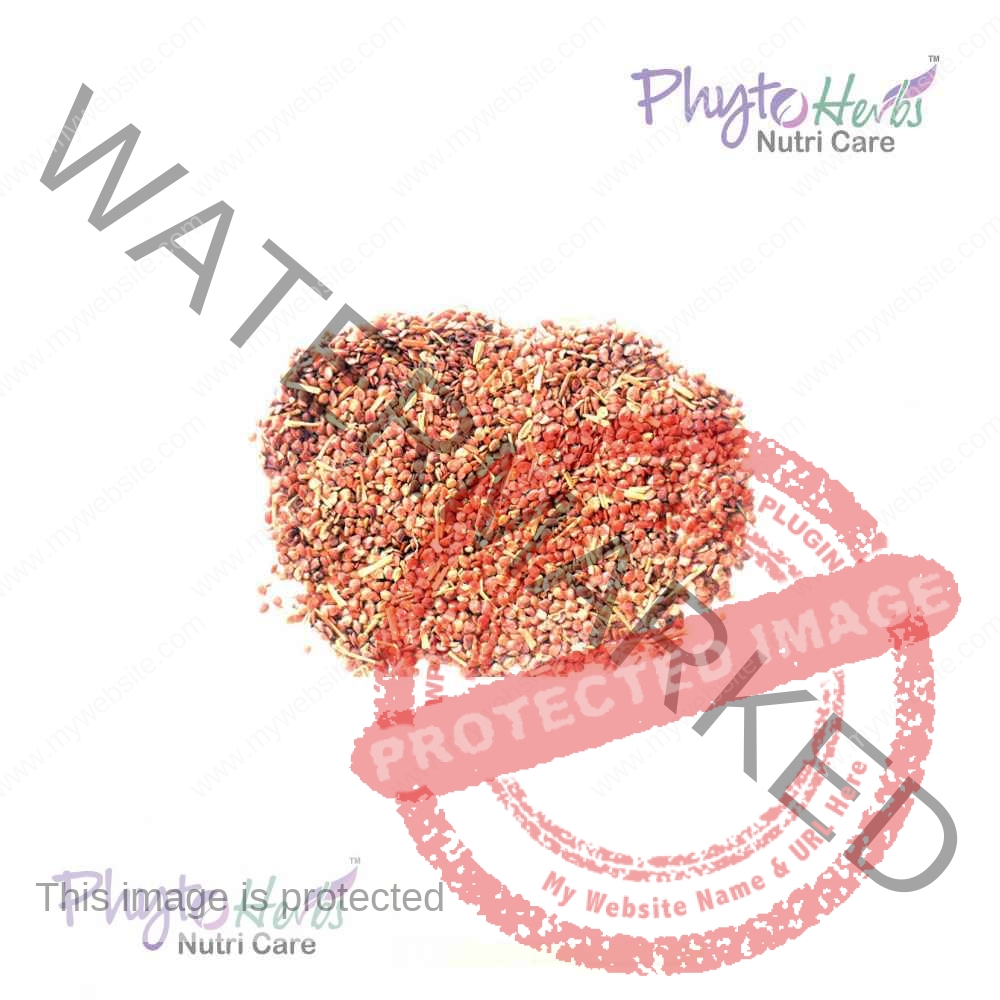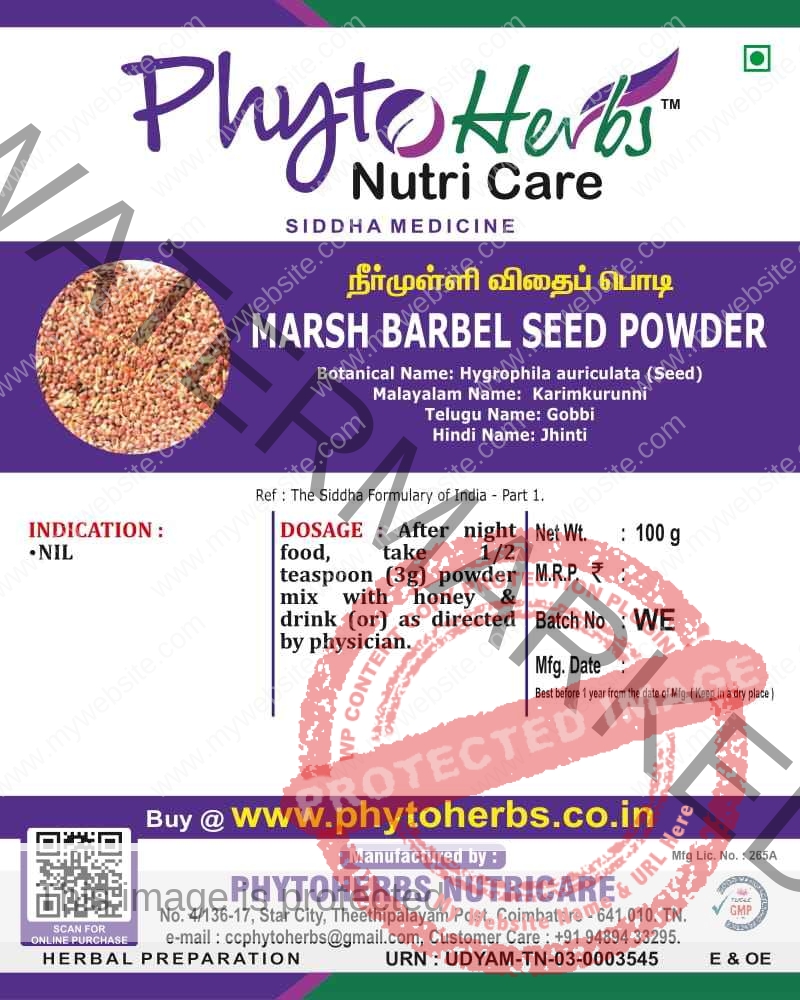Showing 13–24 of 34 results
Show filter-
Dill Seed Powder / சதகுப்பைப் பொடி
₹45.00Botanical Name: Anethum graveolens (Seed)
Tamil Name: சதகுப்பைப் பொடி / Sadhakuppai Podi
Malayalam Name: ശതകുപ്പ / Sathakuppa
Telugu Name: సదాపా విత్తులు / Sadapa Vittulu
Hindi Name: सोयो / SoyoDescription: Anethum graveolens (Dill) has been use as ayurvedic medicine since the ancient times and it is popularly used as spices. It is an aromatic herb, which belongs to the family Apiaceae. There are some of the ayurvedic uses of the seeds of the plant which are carminative, stomachic and diuretic. In unani known as soya, in siddha known as sadakuppai, in Sanskrit known as shatpushpi and in hindi known as sowa.
Traditional Uses: Traditionaly, Anethum graveolens possess a wide range of anti-inflammtory activities. Also, pharmacological studies show antimicrobial, antihyperlipidemic and antihypercholesterolemic activities of dill seeds. It also benefits for Osteoporosis and bone health (Protecting bone mineral density), Managing diabetes (Managing insulin level), Carminative benefits (prevent the embarrassing condition of excessive gas), Immunity hike and Hiccup issues.
Dosage: At morning empty stomach, take 1 teaspoon (5g) powder mix with honey or warm water & drink (or) as directed by physician.
-
Dill Seed Powder / சதகுப்பைப் பொடி
₹100.00 – ₹500.00Botanical Name: Anethum graveolens (Seed)
Tamil Name: சதகுப்பைப் பொடி / Sadhakuppai Podi
Malayalam Name: ശതകുപ്പ / Sathakuppa
Telugu Name: సదాపా విత్తులు / Sadapa Vittulu
Hindi Name: सोयो / SoyoDescription:
Anethum graveolens (Dill) has been use as ayurvedic medicine since the ancient times and it is popularly used as spices. It is an aromatic herb, which belongs to the family Apiaceae. There are some of the ayurvedic uses of the seeds of the plant which are carminative, stomachic and diuretic. In unani known as soya, in siddha known as sadakuppai, in Sanskrit known as shatpushpi and in hindi known as sowa.
Traditional Uses: Traditionaly, Anethum graveolens possess a wide range of anti-inflammtory activities. Also, pharmacological studies show antimicrobial, antihyperlipidemic and antihypercholesterolemic activities of dill seeds. It also benefits for Osteoporosis and bone health (Protecting bone mineral density), Managing diabetes (Managing insulin level), Carminative benefits (prevent the embarrassing condition of excessive gas), Immunity hike and Hiccup issues.Dosage: At morning empty stomach, take 1 teaspoon (5g) powder mix with honey or warm water & drink (or) as directed by physician.
-
Drumstick Seed Powder / முருங்கை விதைப் பொடி
₹70.00 – ₹350.00Botanical Name: Moringa pterygosperma (Seed)
Tamil Name: முருங்கை விதைப் பொடி / Murungai vithai Podi
Malayalam Name: മുരിങ്ങ / Muringai
Telugu Name: మోచకము / Mochakamu
Hindi Name: सेंजन / SenjanaDescription:
Moringa pterygosperma (Drumstick) is a multi-purpose herbal plant used as human food and an alternative for medicinal purposes worldwide. Moringa contains essential amino acids, carotenoids in leaves, and or constituent in food preparation. Some nutritional evaluation has been carried out in leaves and stems.
Therapeutic Properties: The leaves are anti-inflammatory, anodyne, anthelmintic, ophthalmic and rich in vitamin A and C. They are useful in scurvy, vitiated conditions of kapha and vata, wounds, tumours, inflammations and helminthasis. The seeds are acrid, bitter, anodyne, anti-inflammatory, purgative, antipyretic and ophthalmic. They are useful in neuralgia, inflammations, intermittent fevers and opthalmopathy. It also used for வாய்வு (Flatus), விடங்கள்.Dosage: After night food, take 1 teaspoon (5g) powder mix with honey or warm milk & drink (or) as directed by physician.
-
Drumstick Seed Powder / முருங்கை விதைப் பொடி
₹30.00Botanical Name: Moringa pterygosperma (Seed)
Tamil Name: முருங்கை விதைப் பொடி / Murungai vithai Podi
Malayalam Name: മുരിങ്ങ / Muringai
Telugu Name: మోచకము / Mochakamu
Hindi Name: सेंजन / SenjanaDescription: Moringa pterygosperma (Drumstick) is a multi-purpose herbal plant used as human food and an alternative for medicinal purposes worldwide. Moringa contains essential amino acids, carotenoids in leaves, and or constituent in food preparation. Some nutritional evaluation has been carried out in leaves and stems.
Therapeutic Properties: The leaves are anti-inflammatory, anodyne, anthelmintic, ophthalmic and rich in vitamin A and C. They are useful in scurvy, vitiated conditions of kapha and vata, wounds, tumours, inflammations and helminthasis. The seeds are acrid, bitter, anodyne, anti-inflammatory, purgative, antipyretic and ophthalmic. They are useful in neuralgia, inflammations, intermittent fevers and opthalmopathy. It also used for வாய்வு (Flatus), விடங்கள்.
Dosage: After night food, take 1 teaspoon (5g) powder mix with honey or warm milk & drink (or) as directed by physician.
-
Fenugreek Seed Powder / வெந்தயப் பொடி
₹30.00Botanical Name: Trigonella foenum-graecum (Seed)
Tamil Name: வெந்தயப் பொடி / Venthayap Podi
Malayalam Name: ഉലുവ / വെന്തിരം / Uluva / Venthiam
Telugu Name: మెంతులు / Menthulu
Hindi Name: मेथी दाना / Methi DanaDescription: Fenugreek (Trigonella foenum-graecum L.) leaves and seeds have been used extensively for medicinal purposes. Fenugreek seed is known to exhibit anti-diabetic and anti-nociceptive properties and effects such as hypocholesterolaemic, anti-cancer and thyroxine-induced hyperglycaemia. Fenugreek seed in powder or germinated form exhibits anti-diabetic properties, hypocholesterolaemic effect, anti-cancer effect, effect on thyroxine-induced hyperglycaemia and protective effect on ethanol toxicity. It has been used to relieve colds, bronchial complaints, influenza, asthma, catarrh, constipation, sinusitis, pleurisy, pneumonia, sore throat, laryngitis, hay fever tuberculosis and emphysema.
Nutraceutical Properties: Fiber: The fiber content of fenugreek seed extract plays a role in its ability to moderate metabolism of glucose in the digestive tract. Fenugreek can be used as source of natural antioxidants because of the fiber content. Protein: Fenugreek endosperm is highly rich in protein such as globulin, albumin, histidine and lecithin. Seed of fenugreek has a high proportion of protein ranging from 20 to 30% as well as amino acid, 4-hydroxyisoleucine, which contains high potential for insulin-stimulating activity. Vitamins and Minerals: Fenugreek seed is a rich source of vitamins viz. vitamin A, B1, B2, C, nicotinic acid and niacin. In Minerals, it contains potassium, magnesium, calcium, Zinc and iron.
Therapeutic Uses: இளைப்பு நோய் (Tuberculosis), குருதி அழல், நீரிழிவு (Diabetes), நீர்வேட்கை, உடல் எரிச்சல், வெள்ளை (Leucorrhoea).
Dosage: At morning empty stomach, take 1 teaspoon (5g) powder mix with honey or boiled with water & drink after filter (or) as directed by physician.
-
Fenugreek Seed Powder / வெந்தயப் பொடி
₹60.00 – ₹300.00Botanical Name: Trigonella foenum-graecum (Seed)
Tamil Name: வெந்தயப் பொடி / Venthayap Podi
Malayalam Name: ഉലുവ / വെന്തിരം / Uluva / Venthiam
Telugu Name: మెంతులు / Menthulu
Hindi Name: मेथी दाना / Methi DanaDescription:
Fenugreek (Trigonella foenum-graecum L.) leaves and seeds have been used extensively for medicinal purposes. Fenugreek seed is known to exhibit anti-diabetic and anti-nociceptive properties and effects such as hypocholesterolaemic, anti-cancer and thyroxine-induced hyperglycaemia. Fenugreek seed in powder or germinated form exhibits anti-diabetic properties, hypocholesterolaemic effect, anti-cancer effect, effect on thyroxine-induced hyperglycaemia and protective effect on ethanol toxicity. It has been used to relieve colds, bronchial complaints, influenza, asthma, catarrh, constipation, sinusitis, pleurisy, pneumonia, sore throat, laryngitis, hay fever tuberculosis and emphysema.
Nutraceutical Properties: Fiber: The fiber content of fenugreek seed extract plays a role in its ability to moderate metabolism of glucose in the digestive tract. Fenugreek can be used as source of natural antioxidants because of the fiber content.
Protein: Fenugreek endosperm is highly rich in protein such as globulin, albumin, histidine and lecithin. Seed of fenugreek has a high proportion of protein ranging from 20 to 30% as well as amino acid, 4-hydroxyisoleucine, which contains high potential for insulin-stimulating activity.
Vitamins and Minerals: Fenugreek seed is a rich source of vitamins viz. vitamin A, B1, B2, C, nicotinic acid and niacin. In Minerals, it contains potassium, magnesium, calcium, Zinc and iron. Therapeutic Uses: இளைப்பு நோய் (Tuberculosis), குருதி அழல், நீரிழிவு (Diabetes), நீர்வேட்கை, உடல் எரிச்சல், வெள்ளை (Leucorrhoea).Dosage: At morning empty stomach, take 1 teaspoon (5g) powder mix with honey or boiled with water & drink after filter (or) as directed by physician.
-
Java Plum Seed Powder / நாவல் விதைப் பொடி
₹25.00Botanical Name: Syzygium cumini (Seed)
Tamil Name: நாவல் விதைப் பொடி / Naaval vithai Podi
Malayalam Name: ഞാവൽ / Njaval
Telugu Name: నీరీడు / Neereedu
Hindi Name: जाम्बुल / JambulDescription: Syzgium cumini or Java Plum (Jamun) is a very large evergreen tropical tree belonging to the family Myrtaceae. The plant is also mentioned in literature as Jamun, synonym as black plum or jambolan.
Pharmocological Properties: It has been very well known for their pharmacological properties like gastroprotective, antiulcerogenic, antibacterial, anti-infective, and antimalerial. Various mineral and vitamins were reported like Calcium (Ca), Magnesium (Mg), Potassium (K), Iron (Fe), Sodium (Na), Copper (Cu), Chlorine (Cl), vitamin C, vitamin A, riboflavin, nicotinic acid, choline and folic acid. The plant seeds are rich in protein and calcium.
Traditional medicinal uses: In Ayurvedic 1 – 3g of Java Plum is consumed by humans orally to treat diabetes and complications related to diabetes. It also given to aid in clearance of skin marks caused due to blackheads and acne. In Indo-china Jamun seed is used to cure diarrhea, dysentery, diabetes and catarrh. Powdered seeds of Jamun added with juice of sugarcane and given to cure dysentery, opium poisoning, centipede bite and for sores and ulcers.
Dosage: After night food, take 1 teaspoon (5g) powder boil with water & drink after filter (or) as directed by physician.
-
Java Plum Seed Powder / நாவல் விதைப் பொடி
₹60.00 – ₹300.00Botanical Name: Syzygium cumini (Seed)
Tamil Name: நாவல் விதைப் பொடி / Naaval vithai Podi
Malayalam Name: ഞാവൽ / Njaval
Telugu Name: నీరీడు / Neereedu
Hindi Name: जाम्बुल / JambulDescription:
Syzgium cumini or Java Plum (Jamun) is a very large evergreen tropical tree belonging to the family Myrtaceae. The plant is also mentioned in literature as Jamun, synonym as black plum or jambolan.
Pharmocological Properties: It has been very well known for their pharmacological properties like gastroprotective, antiulcerogenic, antibacterial, anti-infective, and antimalerial. Various mineral and vitamins were reported like Calcium (Ca), Magnesium (Mg), Potassium (K), Iron (Fe), Sodium (Na), Copper (Cu), Chlorine (Cl), vitamin C, vitamin A, riboflavin, nicotinic acid, choline and folic acid. The plant seeds are rich in protein and calcium.
Traditional medicinal uses: In Ayurvedic 1 – 3g of Java Plum is consumed by humans orally to treat diabetes and complications related to diabetes. It also given to aid in clearance of skin marks caused due to blackheads and acne. In Indo-china Jamun seed is used to cure diarrhea, dysentery, diabetes and catarrh. Powdered seeds of Jamun added with juice of sugarcane and given to cure dysentery, opium poisoning, centipede bite and for sores and ulcers.Dosage: After night food, take 1 teaspoon (5g) powder boil with water & drink after filter (or) as directed by physician.
-
Mango Nuts Powder / மாம் பருப்புப் பொடி
₹70.00 – ₹350.00Botanical Name: Mangifera indica (Nut)
Tamil Name: மாம் பருப்புப் பொடி / Maam Paruppu Podi
Malayalam Name: മാങ്ങാ / Mangga
Telugu Name: మామిడి / Mamidi
Hindi Name: आम / AamDescription:
The Mango (Mangifera indica) is one of the most important tropical plants. Mangifera indica is a species of mango in the Anacardiaceae family.
Traditional Uses: Various parts of plant are used as a dentrifrice, antiseptic, astringent, diaphoretic, stomachic, vermifuge, tonic, laxative and diuretic and to treat diarrhea, dysentery, anaemia, asthma, bronchitis, cough, hypertension, insomnia, rheumatism, toothache, leucorrhoea, haemorrhage and piles. All parts are used to treat abscesses, broken horn, rabid dog or jackal bite, tumour, snakebite, stings, datura poisoning, heat stroke, miscarriage, anthrax, blisters, wounds in the mouth, tympanitis, colic, diarrhea, glossitis, indigestion, bacillosis, bloody dysentery, liver disorders, excessive urination, tetanus and asthma. Decoction of mango kernel is used, for example, in the treatment of diarrhea, haemorrhages, and bleeding haemorrhoids for its vermifuge and astringent properties, extracts of unripe fruit, bark and leaves are used for their antibiotic activity, while an aqueous stem bark extract from Mangifera indica is used in Cuba as a remedy for diarrhoea, fever, gastritis, and ulcers.Dosage: After noon food, take 1 teaspoon (5g) powder mix with butter milk or water & drink (or) as directed by physician.
-
Mango Nuts Powder / மாம் பருப்புப் பொடி
₹30.00Botanical Name: Mangifera indica (Nut)
Tamil Name: மாம் பருப்புப் பொடி / Maam Paruppu Podi
Malayalam Name: മാങ്ങാ / Mangga
Telugu Name: మామిడి / Mamidi
Hindi Name: आम / AamDescription: The Mango (Mangifera indica) is one of the most important tropical plants. Mangifera indica is a species of mango in the Anacardiaceae family.
Traditional Uses: Various parts of plant are used as a dentrifrice, antiseptic, astringent, diaphoretic, stomachic, vermifuge, tonic, laxative and diuretic and to treat diarrhea, dysentery, anaemia, asthma, bronchitis, cough, hypertension, insomnia, rheumatism, toothache, leucorrhoea, haemorrhage and piles. All parts are used to treat abscesses, broken horn, rabid dog or jackal bite, tumour, snakebite, stings, datura poisoning, heat stroke, miscarriage, anthrax, blisters, wounds in the mouth, tympanitis, colic, diarrhea, glossitis, indigestion, bacillosis, bloody dysentery, liver disorders, excessive urination, tetanus and asthma. Decoction of mango kernel is used, for example, in the treatment of diarrhea, haemorrhages, and bleeding haemorrhoids for its vermifuge and astringent properties, extracts of unripe fruit, bark and leaves are used for their antibiotic activity, while an aqueous stem bark extract from Mangifera indica is used in Cuba as a remedy for diarrhoea, fever, gastritis, and ulcers.
Dosage: After noon food, take 1 teaspoon (5g) powder mix with butter milk or water & drink (or) as directed by physician.
-
Marsh Barbel Seed Powder / நீர்முள்ளி விதைப் பொடி
₹110.00 – ₹550.00Botanical Name: Hygrophila auriculata (Seed)
Tamil Name: நீர்முள்ளி விதைப் பொடி / Neermulli vithai Podi
Malayalam Name: കരിങ്കുറഞ്ഞി / Karimkurunni
Telugu Name: గొబ్బి / Gobbi
Hindi Name: झिण्टी / JhintiDescription:
Hygrophila auriculata or Marsh Barbel (English) is commonly used to call in Tamil as a Neermulli. An annual herbal plant grows up to 60cms altitude. The plant stem is tetragonal, hairy and stiffened at the nodes. The bark is dark brown, although the leaves are elliptic-lanceolate and hispid. The flowers are violet and somewhat purple-blue. Therapeutically, it is useful in inflammation, calculus, hyperactive thirst, diarrhea, poisoning, pain, anemia, abdominal disorders, flatulence, urine retention, burning sensation, rheumatoid arthritis, Prameha, vision disorders, and blood disorders.
Traditional Uses: Traditionally, it is used for the treatment of anasaraca, diseases of urinogenital tract, edema of chronic Bright’s disease, hyperdipsia, vesical calculi, flatulence, diarrhea, dysentery, leucorrhoea, gonorrhoea, asthma, blood diseases, gastric diseases, painful micturition, and menorrhagea.
Medicinal Uses: Its leaf is useful in a cough. Also useful for anal fistula. Its seed is useful in blood disorders. Intake of root decoction is useful for jaundice. Its vegetable is useful in anemia. Neermulli’s root and a whole part decoction are useful in rheumatoid arthritis.
Pharmacological Activities: It has various pharmocological activities viz., aphrodisiac, liver protecting, hypoglycemic, hematopoietic, antioxidant and neuroprotective.Dosage: After night food, take 1/2 teaspoon (3g) powder mix with honey & drink (or) as directed by physician.
-
Marsh Barbel Seed Powder / நீர்முள்ளி விதைப் பொடி
₹50.00Botanical Name: Hygrophila auriculata (Seed)
Tamil Name: நீர்முள்ளி விதைப் பொடி / Neermulli vithai Podi
Malayalam Name: കരിങ്കുറഞ്ഞി / Karimkurunni
Telugu Name: గొబ్బి / Gobbi
Hindi Name: झिण्टी / JhintiDescription: Hygrophila auriculata or Marsh Barbel (English) is commonly used to call in Tamil as a Neermulli. An annual herbal plant grows up to 60cms altitude. The plant stem is tetragonal, hairy and stiffened at the nodes. The bark is dark brown, although the leaves are elliptic-lanceolate and hispid. The flowers are violet and somewhat purple-blue. Therapeutically, it is useful in inflammation, calculus, hyperactive thirst, diarrhea, poisoning, pain, anemia, abdominal disorders, flatulence, urine retention, burning sensation, rheumatoid arthritis, Prameha, vision disorders, and blood disorders.
Traditional Uses: Traditionally, it is used for the treatment of anasaraca, diseases of urinogenital tract, edema of chronic Bright’s disease, hyperdipsia, vesical calculi, flatulence, diarrhea, dysentery, leucorrhoea, gonorrhoea, asthma, blood diseases, gastric diseases, painful micturition, and menorrhagea.
Medicinal Uses: Its leaf is useful in a cough. Also useful for anal fistula. Its seed is useful in blood disorders. Intake of root decoction is useful for jaundice. Its vegetable is useful in anemia. Neermulli’s root and a whole part decoction are useful in rheumatoid arthritis. Pharmacological Activities: It has various pharmocological activities viz., aphrodisiac, liver protecting, hypoglycemic, hematopoietic, antioxidant and neuroprotective.
Dosage: After night food, take 1/2 teaspoon (3g) powder mix with honey & drink (or) as directed by physician.




